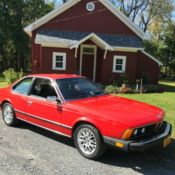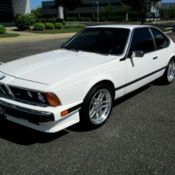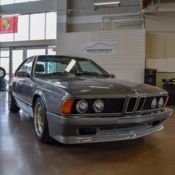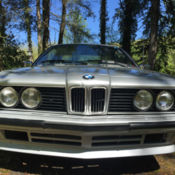Description
1982 BMW 633csi Coupe EURO 1982 BMW 633csi Coupe. also known as "The Shark". This is a Rare 5 speed Coupe with 216. 00 original miles! One Owner vehicle in excellent shape! It is absolutely original and beautifully maintained ! This car is a must see. a real head turner! The 6 Cylinder engine gives good performance ! The sports tuned suspension hugs the road like nobody's business. Original Euro Bumpers. Original Sapphire Blue Paint exterior in excellent shape. you are going to have a hard time finding one like this. The Blue Leather interior of this ride is in very good Condition and is a sign of the excellent care and attention that this vehicle has seen since it was new. The matching Blue Carpet shows like new as well. Recently serviced. everything under the hood is in perfect shape. The top of the line luxury package will completely surround you in both comfort and class. The package includes: 6 Cylinder. 5 Speed Manual Transmission. Rear 2 wheel drive. new tires. Power locks. power windows. AC blows cold. Rear window defroster. AM / FM. Cd Player. nbsp;Don't miss this opportunity to own a True Euro 633csi. One Owner BMW! Please feel free to contact me directly with any questions (858) 733 1030 David HISTORYIf there were only one BMW model epitomizing the perfect blend of luxury. nbsp;sportiness and serious driving pleasure. for many enthusiasts it is the E24 6 Series. It had 12 years of production glory. from 1977 to 1989 (U. S. ). and its design was imitated by many others but never equaled--not even by BMW. Diehard 6er owners often refuse to buy newer models. instead pouring thousands into mechanical and cosmetic work to keep the big coupes cruising. 1980-84: 633csiThe significant revisions BMW brought to the E24 for the 1980 model were all overshadowed by the wonders of Robert Bosch innovations. Using Bosch's ingenious new invention. the oxygen sensor. allowed efficient use of a three-way catalytic converter. The positively horrible and universally hated thermal reactor and EGR emissions control systems were dispensed with at once in favor of this new technology. A new factory electronic ignition system also appeared. The darkest chapter in U. S. -spec BMW engine history was finally at an end. While actual power output remained the same. driveability was immeasurably improved. More importantly. but unbeknownst to us at the time. electronic engine management systems would eventually allow U. S-spec BMW engines to achieve nearly the same power output as rest-of-the-world variants. It would take nearly 10 years. but the course was set in 1980. In 1983-84. Bosch Motronic engine management quietly entered our lives with Motronic version 1. 0 basic. Ignition timing and fuel mixture were now computer-controlled. This early Motronic system. wonderful as it was at the time. is less than desirable today from a performance-tuning standpoint. No chips are available to upgrade the ECU--what you have is what you have. Even though the engines will still respond well to high-compression pistons and camshaft upgrades. electronic optimization is not possible. Similarly. while the catalytic converter is far preferable to the dreaded thermal reactor (writer looks down. spits). the exhaust system on these pre-1985 Motronic cars is incredibly restrictive forward of the cat. The end result was lots of header installations and de-catting prior to that becoming bad juju. and later. installation of 3. 5-liter engines with advanced Motronics. A five-speed manual gearbox backed up the newly invigorated engine. but. contrary to popular close-ratio European fashion. fifth gear was overdriven to reduce engine speeds at cruising velocities. This allowed both increased fuel economy and use of lower (numerically higher) differential ratios to aid acceleration. Traditionally. BMW gears down cars when it wants to spiff up low-end zoot either as a result of engine size. automatic transmission or. in this case. emission controls. The automatic transmission option included cruise control starting in 1982. Outside. the lower front valence panel was revised. and the rear bumper ends were extended to the wheel openings in 1982. A silly federal law mandated an 85-mph speedometer. and BMW stuck a red LED clock in it for some reason. Independent techs sometimes played speedometer baseball out behind the shop with these units. as owners just couldn't stand to look at them. By 1984. we were back to the 140-mph speedometer. Central locking appeared; it was now possible to lock both doors and the trunk with one turn of the key at the driver's door. But the little flap covering that driver's-side door lock would wear out. and you had to replace the entire cylinder--a problem never solved on the E24. The 1982 model year saw a mid-production suspension revision to the now familiar wishbone front control arm design. which eliminated the front strut rods. No outward indications signaled this revolutionary advancement in BMW front suspension design. The wishbone design allowed far greater high-speed stability through increased control of caster angles and afforded greater control over ride quality independent of shock damping qualities. Suspension geometry under heavy cornering loads was also improved. However. the wishbone design is not a panacea. as technicians and do-it-yourselfers are well aware. The 06/82 production date marks both the beginning of the BMW wishbone control arm design and the beginning of the now-notorious BMW front-end vibration proclivities (previous vibration problems with the E21 3 Series were isolated to that model. which did not use wishbone control arms).




